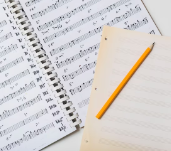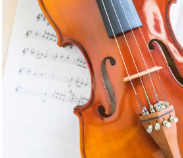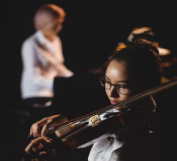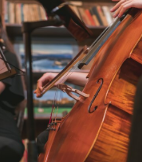The standards for High School Instrumental Music, Advanced Level enable students to acquire and refine advanced technical and expressive skills to demonstrate a variety of musical elements of greater complexity and challenge. Students extend their knowledge of instrument-specific techniques while expanding their vocabulary of scales, arpeggios, and rudiments in increasingly complex rhythmic patterns. Students continue to use a creative process to create personal arrangements and compositions. Students discuss and evaluate characteristics of personal performances and compositions, as well as the works of others. Students research career options in music and the variety of careers that involve skills learned in music. They investigate connections with other disciplines, and analyze the cultural influences, styles, composers, and historical periods associated with the music literature being studied. Opportunities are provided for students to participate in local, district, regional, state, and national events. After-school rehearsals and performances are required of all students. Membership is based on ability, interest, and experience and requires the director's approval. Content in this course changes annually; therefore, this course may be repeated.
Audition and/or Director's approval
Essential Question: What defines a refined advanced-level ensemble performance?
|
Quarter |
Quarter 1 |
Quarter 2 |
Quarter 3 |
Quarter 4 |
|
Unit Title |
The Processes that Prepare Us |
Building the Skills to Display on the Stage |
Practice, Perform, Assess, Reflect, Practice, Preform, Assess… |
The Music, World and Me |
|
Image Cue |
 |
 |
 |
 |
|
Focus of the Story |
The year begins with exploring the process of preparing for a rigorous audition. We prepare scales and pre-selected études and learn how to self-manage a practice routine within a short timeframe. |
We continue the year by preparing for our first performances by selecting challenging yet appropriate literature. Preparing includes exploring the history behind those pieces and their composers while working on tone and technique skills to apply in our music selections. |
Next, we move to refine our program for our District Orchestra Assessment. We will prepare for a rigorous adjudication process by a panel of judges, including a sight reading component. Students will reflect on the feedback and their own experience to fuel suggestions for further improvement. |
We end our year with a focus on solo or smaller ensemble rehearsals and performances while demonstrating a high level of mastery in terms of individual musicianship and musical maturity. We will also explore conducting patterns, improvisation, music technology, and music career pathways. |
|
Transfer Goals |
Understand and apply creative processes to guide the development of ideas, original works, and musical performance. Analyze, interpret, and evaluate musical works from a variety of cultures. Use music literacy to demonstrate understanding of the elements of music and the ways they inform artistic performance and creative expression. |
Understand and apply creative processes to guide the development of ideas, original works, and musical performance. Analyze, interpret, and evaluate musical works from a variety of cultures. Use music literacy to demonstrate understanding of the elements of music and the ways they inform artistic performance and creative expression. Use technology as a strategic mechanism for improving music literacy and improving music performance. |
Understand and apply creative processes to guide the development of ideas, original works, and musical performance. Analyze, interpret, and evaluate musical works from a variety of cultures. Understand and find meaning in music as a form of community engagement through involvement as a performer, supporter, advocate, and audience member. Curate a portfolio of accomplishments, experiences, and performance materials exhibiting oneself as an artist. Use music literacy to demonstrate understanding of the elements of music and the ways they inform artistic performance and creative expression. |
Understand and apply creative processes to guide the development of ideas, original works, and musical performance. Analyze, interpret, and evaluate musical works from a variety of cultures. Explore and connect personal interests, experiences, and aspirations through vocation, advocacy, and arts patronage. Curate a portfolio of accomplishments, experiences, and performance materials exhibiting oneself as an artist. Use music literacy to demonstrate understanding of the elements of music and the ways they inform artistic performance and creative expression. Use technology as a strategic mechanism for improving music literacy and improving music performance. |
|
Learning Targets |
I can create specific and attainable goals for personal practice and overall musical growth I can understand the importance of continued practiceI can play scales from the Senior Regional Orchestra scale requirements. I can tune by ear and/or with the aid of technology I can perform the required etude. I can sight read musical excerpts. I can evaluate my performance using the provided rubric. I can demonstrate good posture. I can sight read music using an established procedure. I can play excerpts from the concert music. I can demonstrate appropriate stage etiquette at the concert. |
I can understand the importance of continued practice. I can effectively plan practice sessions for short-term and long-term growth. I can describe and interpret music as part of a creative process. I can discuss and incorporate musical elements to evoke emotion and musicality in performance. I can self-assess using rubrics to gauge musical progress. I can describe the historical and cultural background of chosen literature. I can use technology and other resources as tools for musical analysis. I can understand the value of public performance and advocacy. I can play assigned scales with good posture, tone, technique and intonation. I can apply an effective sight reading procedure. I can identity and address technical challenges in music. |
I can create specific and attainable goals for personal practice and overall musical growth. I can discuss and incorporate musical elements to evoke emotion and musicality in performance I can showcase ensemble stage procedures and performance etiquette. I can self-assess using rubrics and gauge musical progress. I can describe the historical and cultural background of chosen literature. I can use technology and other resources as tools for musical analysis. I can apply an effective sight reading procedure I can demonstrate appropriate posture and technique I can play in tune and with a quality tone I can identity and address technical challenges in music |
I can play assigned scales with good posture, tone, technique and intonation. I can demonstrate appropriate stage etiquette at a concert performance. I can play excerpts from the concert literature. I can evaluate my concert performance using a rubric. I can select an appropriate solo or small ensemble composition. I can create a preparation plan for my solo project. I can collaborate with other students in preparation for the solo/ensemble. I can apply my knowledge of string techniques, music history, and performance practice to my solo selection. |
